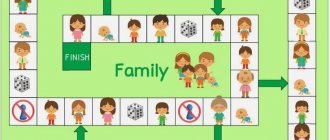Knowledge of English gives a great advantage, opening up a lot of opportunities for a person. Therefore, it is not surprising that many parents of preschool children are concerned about this issue, and, not hoping for a comprehensive school, enroll their children in courses to study it. What are such activities for kids - entertainment or creating a good foundation for the future?
At what age should you start studying?
The examples of Mowgli children available in history convincingly illustrate that you can teach a person to talk only in childhood; later this is no longer possible. In the case of learning a foreign language, the situation is similar: the earlier a child starts learning it, the better it is learned - that’s what scientists say. On the other hand, many parents and teachers are confident that there is no point in spending time and money on teaching English to preschoolers, since at middle or high school age children are able to master the material in 1-3 months to the extent that children spend a whole year on .
An analysis of the characteristics of foreign language acquisition by children and adults in the context of the following categories will help weigh the pros and cons.
- Phonetics and pronunciation. Thanks to the excellent ability to imitate, which remains in children after they have completely mastered the phonetic system of their native language, preschoolers can easily imitate unusual foreign sounds. An adult, unless he has extraordinary abilities, will not be able to reproduce many sounds correctly if the phonetic base was not laid in childhood.
- Grammar. This section of a foreign language is mastered through targeted study, and therefore is accessible only to children of middle school age and older. Preschoolers can only mechanically memorize and repeat individual phrases.
- Reading. The ability to read even short texts in a foreign language implies at least basic knowledge of the rules of grammar. Kids can only read individual words or memorized songs and poems.
- Lexicon. Here the advantage is also in favor of the older age, since the number of new words increases as various topics are studied, and for preschoolers their number is limited.
It turns out that the main advantage of English language courses for preschool children is creating the basis for good pronunciation. If a child attends classes 2 times a week, at best he will get a rough introduction to the subject and master the sound system. Another thing is the parallel study of two languages, as happens in bilingual families. In this case, both languages are involuntarily acquired by the child as native languages at a conversational level, and reading and writing develop later.
English at 3-4 years old
The debate about early learning is as old as the world - there is no consensus on this matter.
But the generally accepted “starting” age can be considered 3 years. As for the first acquaintance with foreign languages, the period from 3 to 7 years is considered the best time for this. This is due to the fact that it is at this age that the child develops logical forms of thinking and voluntary attention. The formation of the latter leads to the fact that the child begins to resort to already mastered methods of memorizing information: repeats what he hears, tries to comprehend what is being memorized in the required sequence.
During the same period, speech and phonemic hearing intensively develop, vocabulary expands, and the morphological system of the language spoken by everyone around is fixed in the mind.
Some parents refuse preschool education for their child so as not to “deprive him of his childhood,” because education is associated with coercion, routine, and punishment for mistakes. Thick textbooks with yellowed pages and teachers who have never been to English-speaking countries are a wall between us and fluent English. It is up to our children to overcome or even break this wall; today’s young millennials are tomorrow’s bilinguals.
Gradually, the fear of early learning recedes, because, it seems, there is no longer any need to explain that a little person can be taught anything just by playing with him.
At such an early stage, it is not necessary to send your child to special courses. You yourself will be able to cope perfectly with the first stage of mastering English. In addition, classes with a parent eliminate the stress factor of an unfamiliar place, teacher and other children. Here's how to do it.
By the way, online English classes for children 7 years old are held in a comfortable environment: students can study at home, at their grandmother’s, or at the dacha. In individual lessons, no one will distract the child from gaining new knowledge, and textbooks and notebooks are not needed - only the Internet.
Recommendations for conducting classes and games
Despite the limited capabilities of preschoolers in mastering a foreign language, many teachers note that children who studied English at an early age master it more easily and successfully as part of the school curriculum. Not the least role in this is played by the positive attitude towards classes, formed in children thanks to the playful form of learning to which they are accustomed. Games in English lessons are also good because they can be not only educational, but also developmental.
Games with cards
Visual-figurative thinking, characteristic of children, makes cards with English letters, words, actions and objects written on them one of the most popular learning tools at all its stages. Here are just a few examples.
- “Name the picture.” This game is good for beginners: the teacher shows the children a card and names the animal drawn on it, for example a cat, and then passes it to one of the students. The guys take turns repeating the word “cat”, passing the picture to each other. This exercise allows all participants to practice pronunciation, and also creates a “success situation”, which psychologists consider very important for increasing motivation to learn. Over time, this game can become more difficult. For example, children can say not just “cat”, but “this is a cat” - the complexity of pronunciation increases, and the simplest grammatical structure appears.
- “Describe the picture.” At the next stage, you can give the task to each of the participants to add some suitable description to the word: “little cat”, “black cat”, “lazy cat” - of course, after studying the corresponding words.
- "What's missing?" You need to pin several cards on the board and ask the children to memorize them, and then have them close their eyes for a while. The presenter removes 1-2 pictures, after which the students remember and name the disappeared images. This game develops memory and attention.
Poems and songs
One of the best helpers in working with preschoolers is music. Children associate it with fun and strengthen their sympathy for the subject being studied. Simple poems and songs are easy to remember, help expand vocabulary and create a feeling of quick results: while reciting a rhyme, the child seems to already be speaking English, and this is much more interesting than simply repeating words or the alphabet. It motivates. In addition, poems often contain useful information: for example, about the seasons, days of the week, colors of the rainbow, numbers. There are songs with names of body parts or some physical actions - their performance must be accompanied by appropriate movements.
Cartoons and educational videos
A lesson in a group of preschoolers involves alternating several types of activities, since children cannot concentrate on any one task for more than 10-15 minutes. When inventing various games for them, one should not neglect the achievements of technological progress: educational cartoons in English will not only delight little students, but will also allow them to consolidate authentic sounds in their memory, learn new words and mechanically remember the rules for using grammatical structures, the essence of which they will comprehend through several years at school. After watching the video, it will be useful to arrange a short scene based on it, using the phrases and words heard in it.
Guessing Games
Asking questions and drawing logical conclusions from the answers is a useful exercise for children, even if it is done in their native language. During English classes, memory work is also connected to logical mental operations. You can guess animals, people, vegetables, fruits - all within the framework of the material covered.
In the game you can use not only different groups of objects, but also different grammatical entities.
- Third person - one of the players thinks of a vegetable, and the rest ask him questions: “is it red?”, “is it round?”, “is it a tomato?” When the item is guessed, the presenter gives an affirmative answer: “Yes, it is a tomato.”
- Second and first persons: “Are you a tomato?” - “Yes, I am a tomato.”
This way, children automatically learn grammatical patterns, which helps develop their ability to speak English rather than just memorizing individual words.
General recommendations, literature
The variety of English lessons for kids is endless. Drawing and coloring, modeling, crafts, songs and dances, skits, active and role-playing games - all this can and should be organically included in classes. It is useful and fun for children to study in a group, but if you wish, it is easy to organize training for your child yourself at home. In this case, it is worth choosing a good textbook to rely on.
Experts recommend using textbooks by English-language authors, written entirely in English. Among them are guides for beginners - for example, the Activity Book for Children from Oxford, which contains several parts of a fascinating coloring book on which objects are labeled in a certain color. During the coloring process, the child will remember the names of the colors.
Picture Grammar for Children is another picture-based textbook. It is intended for children who have already passed the elementary level. Here, students are encouraged not only to memorize new words, but also to learn to write them, compose sentences from them, and answer questions. In an easy and unobtrusive form, the child will train oral speech skills, and this is exactly what is primarily meant by language proficiency. There are also excellent Russian-language textbooks and tutorials, for example, “English for Kids” edited by N. A. Bonk (authors I. A. Shishkova, M. E. Verbovskaya) . Equipped with interesting audio materials, it is perfect for working with children 4-6 years old.
The book “English for Children. Great tutorial" by Sergei Matveev . The information in it is presented clearly and in detail so that parents can easily work with their children on their own.
When deciding whether it is necessary to teach English to a child under 6-7 years old, it is worth considering that such classes will not only benefit him in preparation for school, but will also broaden his horizons and help him feel more confident in the company of his peers. You shouldn’t expect your child to speak English right away, but there is no doubt that the acquired knowledge will come in handy when learning the language at an older age.
Zaitsev's technique
The next common technique is that of Nikolai Zaitsev. Suitable for both toddlers and older preschoolers. To teach younger children, the teacher (or parents) give them specially designed blocks with syllables to form words with. Those. memorization occurs in a playful and visual form. The next level also uses cubes.
The main idea is to make the algorithm for constructing sentences in English clear and simple. For each member of a sentence there is a specific color, and the child, having memorized the order of colors, say, for negative sentences, trains to form words under dictation. This is not an easy task for children, but its effectiveness has been proven.
The methodology also includes various manuals and tables, thanks to which parents themselves can conduct lessons without any problems.






